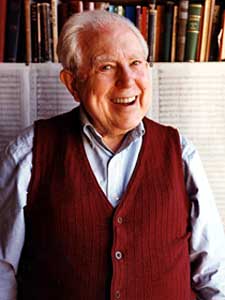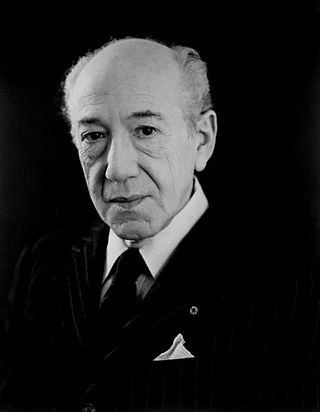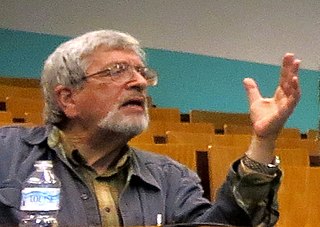Related Research Articles

Anton Friedrich Wilhelm von Webern, better known as Anton Webern, was an Austrian composer whose music was among the most radical of its milieu in its sheer concision, even aphorism, and steadfast embrace of then novel atonal and twelve-tone techniques. With his mentor Arnold Schoenberg and his colleague Alban Berg, Webern was at the core of those within the broader circle of the Second Viennese School. Little known in the earlier part of his life, not only as a student and follower of Schoenberg, but also as a peripatetic and often unhappy theater music director with a mixed reputation for being a demanding conductor, Webern came to some prominence and increasingly high regard as a vocal coach, choirmaster, conductor, and teacher during Red Vienna. With Schoenberg away at the Prussian Academy of Arts, Webern began writing music of increasing confidence, independence, and scale during the latter half of the 1920s—his mature chamber and orchestral works, music that, initially more than his earlier expressionist works, would later decisively influence a generation of composers. Amid Austrofascism, Nazism, and World War II, Webern remained nevertheless committed to taking the "path to the new music", as he styled it in a series of private lectures delivered in 1932–1933. He continued writing some of his most mature and later celebrated music while increasingly ostracized from official musical life as a "cultural Bolshevist", taking occasional copyist jobs from his publisher as he lost students and his conducting career.

The Pulitzer Prize for Music is one of seven Pulitzer Prizes awarded annually in Letters, Drama, and Music. It was first given in 1943. Joseph Pulitzer arranged for a music scholarship to be awarded each year, and this was eventually converted into a prize: "For a distinguished musical composition of significant dimension by an American that has had its first performance in the United States during the year."

Milton Byron Babbitt was an American composer, music theorist, mathematician, and teacher. He is particularly noted for his serial and electronic music.

Elliott Cook Carter Jr. was an American modernist composer. One of the most respected composers of the second half of the 20th century, he combined elements of European modernism and American "ultra-modernism" into a distinctive style with a personal harmonic and rhythmic language, after an early neoclassical phase. His compositions are performed throughout the world, and include orchestral, chamber music, solo instrumental, and vocal works. The recipient of many awards, Carter was twice awarded the Pulitzer Prize.

Process music is music that arises from a process. It may make that process audible to the listener, or the process may be concealed.

Walter Hamor Piston, Jr., was an American composer of classical music, music theorist, and professor of music at Harvard University.

David Leo Diamond was an American composer of classical music. He is considered one of the preeminent American composers of his generation. Many of his works are tonal or modestly modal. His early compositions are typically triadic, often with widely spaced harmonies, giving them a distinctly American tone, but some of his works are consciously French in style. His later style became more chromatic.

Roger Huntington Sessions was an American composer, teacher and musicologist. He had initially started his career writing in a neoclassical style, but gradually moved further towards more complex harmonies and postromanticism, and finally the twelve-tone serialism of the Second Viennese School. Sessions' friendship with Arnold Schoenberg influenced this, but he would modify the technique to develop a unique style involving rows to supply melodic thematic material, while composing the subsidiary parts in a free and dissonant manner.

Richard Filler Taruskin was an American musicologist and music critic who was among the leading and most prominent music historians of his generation. The breadth of his scrutiny into source material as well as musical analysis that combines sociological, cultural, and political perspectives, has incited much discussion, debate and controversy. He regularly wrote music criticism for newspapers including The New York Times. He researched a wide variety of areas, but a central topic was the Russian music of the 18th century to present day. Other subjects he engaged with include the theory of performance, 15th-century music, 20th-century classical music, nationalism in music, the theory of modernism, and analysis. He is best known for his monumental survey of Western classical music, the six-volume Oxford History of Western Music. He received several awards, including the first Noah Greenberg Award from the American Musicological Society in 1978, and the Kyoto Prize in Arts and Philosophy in 2017.
Martin Boykan was an American composer known for his chamber music as well as music for larger ensembles.
The Composers String Quartet was a string quartet best known for performances of new works by contemporary composers, including quartets by Elliott Carter and Ruth Crawford Seeger. Carter's Fourth Quartet was dedicated to the Composers Quartet, who premiered the work in 1986. The group has performed quartets by more than 60 American composers, and has toured abroad extensively.
Edward Toner Cone was an American composer, music theorist, pianist, and philanthropist.
The String Quartet No. 1 by American composer Elliott Carter is a work for string quartet written during a year spent in the Sonoran Desert near Tucson, Arizona from 1950–51. To some extent, it can be said that this was his first major breakthrough work as a composer. The piece was premiered on 26 February 1953 at Columbia University, performed by the Walden Quartet of the University of Illinois.
Franklin Cox is an American composer, scholar, and cellist.
The Third String Quartet by American composer Elliott Carter was completed in 1971. It is dedicated to the Juilliard String Quartet, and it was premiered in 1973. This quartet earned Carter his second Pulitzer Prize in Music in 1973.
The Fourth String Quartet by American composer Elliott Carter was composed in 1985–86 in New York City and Rome, and completed in June 1986. It was premiered on September 17, 1986, at Festival Miami, University of Miami, Florida by the Composers String Quartet.
Roger Sessions' Violin Concerto was composed between 1927 and 1935, and is scored for violin and orchestra.
Alan Belkin is a Canadian composer, organist, pianist as well as a pedagogue.
References
- ↑ "Carter, Elliott | Grove Music". www.oxfordmusiconline.com. doi:10.1093/gmo/9781561592630.article.05030 . Retrieved 2019-04-16.
- ↑ Taruskin, Richard. Oxford History of Western Music. Oxford University Press. p. 296.
- ↑ Taruskin, Richard. Oxford History of Western Music. Oxford University Press. p. 300.
- Carter, Elliot. “Shop Talk by an American Composer.” In Collected Essays and Lecture, 1937-1995, ed. Jonathan Bernard, 214-224. Rochester, NY: University of Rochester Press, 1997; reprinted from Musical Quarterly 46, no. 2 (April 1960): 189-201.
- Carter, Elliot. “String Quartets Nos. 1, 1951, and 2, 1959.” In Collected Essays and Lecture, 1937-1995, ed. Jonathan Bernard, 231-235. Rochester, NY: University of Rochester Press, 1997. Reprinted from sleeve notes from Composers String Quartet, Nonesuch Records H-71249 (1970).
- Schiff, David. The Music of Elliott Carter. Second edition. Ithaca: Cornell University Press, 1998 (1983).